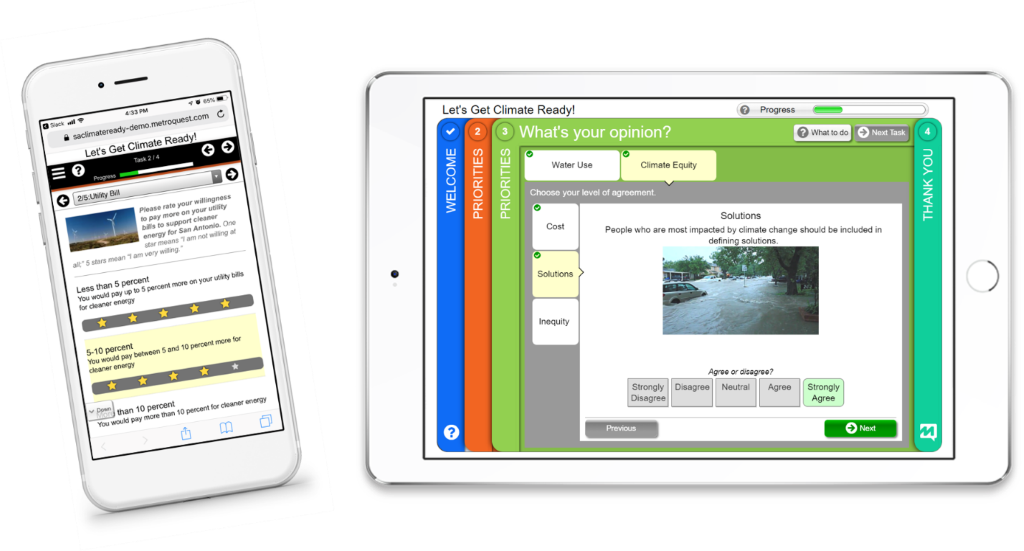Climate Change – Engaging the Public to Improve Sustainability

The climate is changing. Around the globe, incredibly important work is being done to address the effects of climate change on humans, animals, ecosystems – in fact, the entire planet. At MetroQuest, we’re thrilled to be a part of the solution, helping governments and planning firms to facilitate meaningful engagement with communities on climate change … to gather feedback as well as to foster buy-in for ways to respond.
Many citizens still wonder, “how can we effectively respond to climate change?”
Engaging communities on climate change response policies is an important step towards informing the public as well as receiving support in pursuing adaptation and mitigation strategies to manage climate change.
Climate change response policies typically fall into two categories: adaptation and mitigation. Simply stated, mitigation aims to reduce and curb greenhouse gas (GHG) emissions. Mitigation measures include practicing energy efficiency, using renewable energy, and using efficient transportation like electric buses, shared cars or bicycles. Adaptation, on the other hand, means finding solutions to address current or future effects of climate change, like landscape restoration, flexible cultivation, and more secure infrastructure (source: www.activesustainability.com).
Even more, ensuring that the public is given opportunities to participate in making decisions towards a sustainable future and having a say in dealing with climate change seems logical – after all, it’s the general public who will be affected by climate change as well as the decisions made by their governments.
The UNFCCC considered this important enough to specifically set it out in Article 6, which states that the signatory countries to the convention (including Canada and the United States) are to “promote and facilitate public participation in addressing climate change.”
This, however, can fall into the category of ‘easier said than done.’ The published paper, Public participation and climate change adaptation: avoiding the illusion of inclusion, highlights some of the challenges of public participation in decision-making processes for managing climate change. It describes the difficulty of ensuring that a broad demographic is engaged, in part due to the modes employed and in part due to the scientifically complex and multi-generational nature of the subject matter. Climate change requires action now in advance of major climate impacts.
While these challenges may be true for traditional public participation or engagement avenues – like public meetings – the world has made astonishing leaps in the public engagement space over the past decade.
Online public engagement has entirely redefined our expectations for effective public participation in making more sustainable decisions as we plan our cities and transportation networks.
At MetroQuest, we’ve again and again seen consultants and agencies use visually engaging online surveys to successfully distill these complex issues into manageable material, and with that, inform and engage the public online, and ultimately succeed in collecting informed input from communities to help shape more effective local and regional responses to climate change.
In fact, particularly on the highly complex and hotly (excuse the pun) debated issue of climate change, online community engagement allows us to not only capture ideas, but to also assess the public’s willingness to implement changes, and therefore test the feasibility of possible solutions, all while providing much needed information to the community.
While many community engagement activities are conducted for similar purposes, online community engagement also has the added benefit of being widely accessible and thereby able to reach a much wider and broader demographic. MetroQuest is helping reach all demographics, including the traditionally difficult to engage youth. These are the critical voices of the next generation … and now they can participate and impact climate change strategies from the convenience of their smart phones.
Let’s take a look at a powerful example of how governments are using online engagement to engage the public in making their communities more sustainable. We’ll explore how our friends at Kim Lundgren Associates are working on this with San Antonio, Texas.
The city is in the midst of developing a Climate Action and Adaptation Plan (CAAP) that touches on mitigation as well as adaptation elements. It includes both a roadmap to reducing GHG emissions and plans for adapting to climate change to ensure that the community stays the vibrant place it is today for future generations to come.
San Antonio is taking a progressive approach to preparing itself by focusing on the three pillars of sustainability: economic, environmental, and social. This corresponds to the three imperatives of sustainable development, a term derived from the famous 1987 Bruntland Report, which formed the basis for most sustainability work undertaken over the past thirty years.
San Antonio’s community engagement goals were progressive. The city aimed:
- to ensure that a diverse sample, both geographically and demographically, were engaged throughout the planning process and were subsequently represented; and,
- to “foster valuable engagement” on their climate mitigation as well as adaptation strategies.
In addition to online community engagement with MetroQuest, public meetings and open houses were held, social media campaigns were launched, steering committees and technical work groups were formed, stakeholder meetings were held, and a project website and email campaign were launched. Earlier this year, San Antonio released an impressive first draft of the CAAP to the public and a revised draft was created after stakeholder input was gathered.
The online community engagement through MetroQuest asked community members a number of questions, from rating their willingness to adopt cleaner energy choices to indicating the importance of specific factors in their decision-making process, such as cost or convenience.
Their MetroQuest survey also asked what San Antonio should focus on with topics ranging from energy use and clean energy to questions about alternatives to driving GHG emitting cars including public transit, active transportation, and electric vehicles. It directly gauged the public’s willingness to adopt different strategies in each category as well as factors influencing their current and future decision making. You can try out a demo version of their survey here:

Almost a thousand participants were engaged online and nearly 30,000 data points were collected with San Antonio’s MetroQuest survey!
Not only did they receive buy-in from the community beforehand, but the participants actively helped to create the plan to move San Antonio forward. In the report that followed, the Mayor of San Antonio, Ron Nirenberg, stated:
“Throughout the SA Climate Ready process, people from across the community have helped craft a sustainable community approach by examining best practices and policies around how we build; how we power our homes, cars and businesses; how we travel; how we conserve water and green space; how we reduce air pollution; and, perhaps most importantly, how we take care of our most vulnerable neighbors.”
The results of the online community engagement through MetroQuest is reaffirming; almost 65% of people would be willing to pay 5% more on their utility bill for cleaner energy, almost 45% even up to 10% more. Cost of electric vehicles as well as availability of infrastructure such as charging stations were important factors for almost 2/3 of the respondents in their decisions to purchase a car-share or electric vehicle – both factors that a government could address with incentives or initiatives now that they are aware of these potential hindrances.
As the report also notes, the “successful implementation of the CAAP will require participation from all members of San Antonio’s community.” So, it’s logical to include as many members of the community in creating the CAAP in the first place via effective public engagement.
The members of the community that were engaged using the MetroQuest survey clearly agree: in fact, 80% of people either chose ‘strongly agree’ or ‘agree’ with the statement that “people who are most impacted by climate change should be included in defining solutions.” The full results from the MetroQuest survey can be found in Appendix II.
Online community engagement serves agencies who are looking for community input while satisfying the desire from the community to be a part of the solution. For the hot topics of today (there’s the pun again) that cannot succeed without the participation of the general public – like climate change adaptation and mitigation – online community engagement is a logical step to both inform and engage a community on possible strategies before embarking on implementing them. Public engagement early in the planning process is key to effective climate change action.


